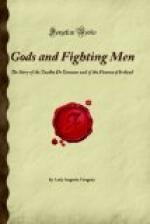“And to-morrow,” he said, “they will be coming to make an attack on us, and there is no one but myself and my brothers left; and we knew we would be in danger, and that we could make no stand against them. And we sent that bare-headed girl beyond to Toraig in the North in the shape of a foolish fawn, and you followed her here. It is that girl washing herself, and having a green cloak about her, went looking for you.
“And the empty side of the house,” he said, “belonged to our people that the Men of Dea have killed.”
They spent that night in drinking and in pleasure. And when they rose up in the morning of the morrow, Donn, son of Midhir, said to Finn, “Come out with me now on the lawn till you see the place where we fight the battles every year.” They went out then and they looked at the graves and the flag-stones, and Donn said: “It is as far as this the Men of Dea come to meet us.” “Which of them come here?” said Finn.
“Bodb Dearg with his seven sons,” said Donn; “and Angus Og, son of the Dagda, with his seven sons; and Finnbharr of Cnoc Medha with his seventeen sons; Lir of Sidhe Fionnachaidh with his twenty-seven sons and their sons; Tadg, son of Nuada, out of the beautiful hill of Almhuin; Donn of the Island and Donn of the Vat; the two called Glas from the district of Osraige; Dobhran Dubthaire from the hill of Liamhain of the Smooth Shirt; Aedh of the Island of Rachrainn in the north; Ferai and Aillinn and Lir and Fainnle, sons of Eogobal, from Cnoc Aine in Munster; Cian and Coban and Conn, three sons of the King of Sidhe Monaid in Alban; Aedh Minbhreac of Ess Ruadh with his seven sons; the children of the Morrigu, the Great Queen, her six-and-twenty women warriors, the two Luaths from Magh Life; Derg and Drecan out of the hill of Beinn Edair in the east; Bodb Dearg himself with his great household, ten hundred ten score and ten. Those are the chief leaders of the Tuatha de Danaan that come to destroy our hill every year.”
Finn went back into the hill then, and told all that to his people.
“My people,” he said, “it is in great need and under great oppression the sons of Midhir are, and it is into great danger we are come ourselves. And unless we make a good fight now,” he said, “it is likely we will never see the Fianna again.”
“Good Finn,” every one of them said then, “did you ever see any drawing-back in any of us that you give us that warning?” “I give my word,” said Finn, “if I would go through the whole world having only this many of the Fianna of Ireland along with me, I would not know fear nor fright. And good Donn,” he said, “is it by day or by night the Men of Dea come against you?” “It is at the fall of night they come,” said Donn, “the way they can do us the most harm.”
So they waited till night came on, and then Finn said: “Let one of you go out now on the green to keep watch for us, the way the Men of Dea will not come on us without word or warning.”




